On a breezy summer afternoon in Karachi, the pristine-blue waters of the swimming pool at Beach Luxury Hotel are turbulent with activity, in contrast to the calmly flowing China Creek, on the banks of which the hotel is located. Some young people are diligently doing breast stroke laps, kids are diving and a bunch of prep-schoolers are sitting in a row on the poolside. Their goggled heads turned towards the gray haired, heavily-tanned swim coach in orange, Hawaiian-printed swim trunks.
“AUNTY… ITS YOUR TURN NOW, STAND UP, ARMS STRAIGHT IN FRONT OF YOU, SAY BISMILLAH, GO” he yells at a tiny four-year-old girl who jumps in smoothly without a splash and swims a lap like a fish. Next is a three-year-old boy, reluctant to jump in. “MEIN PHEK DUNGA PANI MEIN!” he warns the boy sitting on the edge of the pool and his mum hides a smile. And the swimming class continues with kids working hard at diving and doing different swim strokes, following instructions of their swim coach.
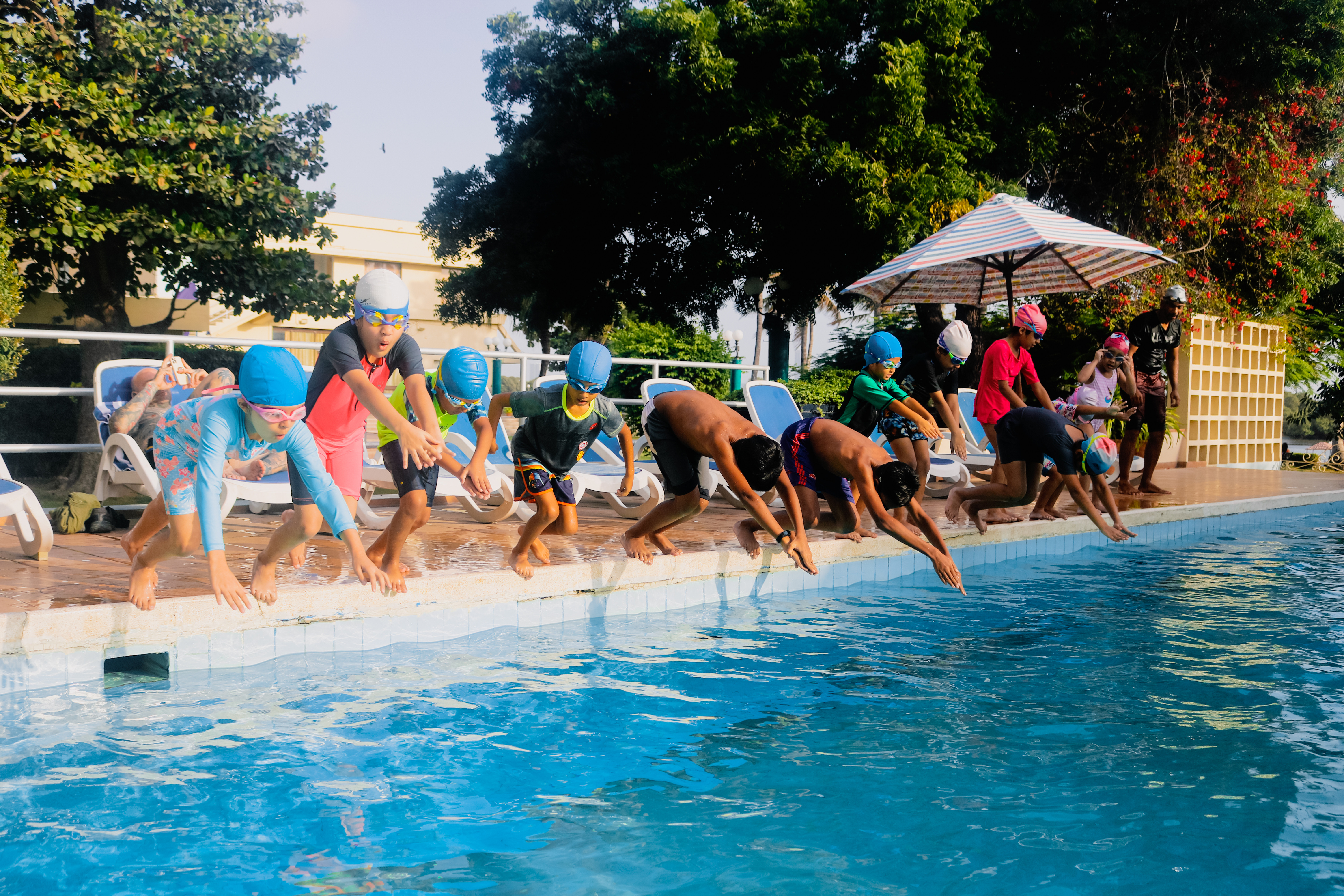
The white plastic tables laden with swimming bags, wet towels and swimming gear are occupied by the proud young parents (and a grandparent or two) of these kids who are here to learn to swim by Bato Uncle, who has been a swimming coach at this pool for the past thirty years.
Sixty-five year old Syed Hamid Ali, better known as Bato Uncle is recognised as a legend in Karachi’s swimming circles for his time coaching generations how to swim.
His boisterous personality appeals to children and grown-ups alike. At the pool, he addresses any male between six to 60 years of age as ‘Uncle’ and likewise’ any female as ‘Aunty’. In between instructions to his class, he also keeps talking to a three-year-old who is crying because he doesn’t want to go in the water. He wades in the water to go closer to him. Still speaking loud enough for his parents to hear. “IF YOU CRY, I WILL ALSO CRY, TUM RONA KE LIYE AAYE HO YA TAIRNAY KE LIYE?” [Are you here to cry or to swim]
Two minutes later, he the little boy had jumped in and using minimal support by Bato, he floated on his back, and his parents no longer looked anxious, but smiled. “Meine swim kiya ya tumne kiya? [Did I swim or was it you?]” Bato asks the little boy who smiles shyly after completing the lap.
His loud pitch which can be heard across the pool is his signature style, and much loved and appreciated by people who have learnt from him.
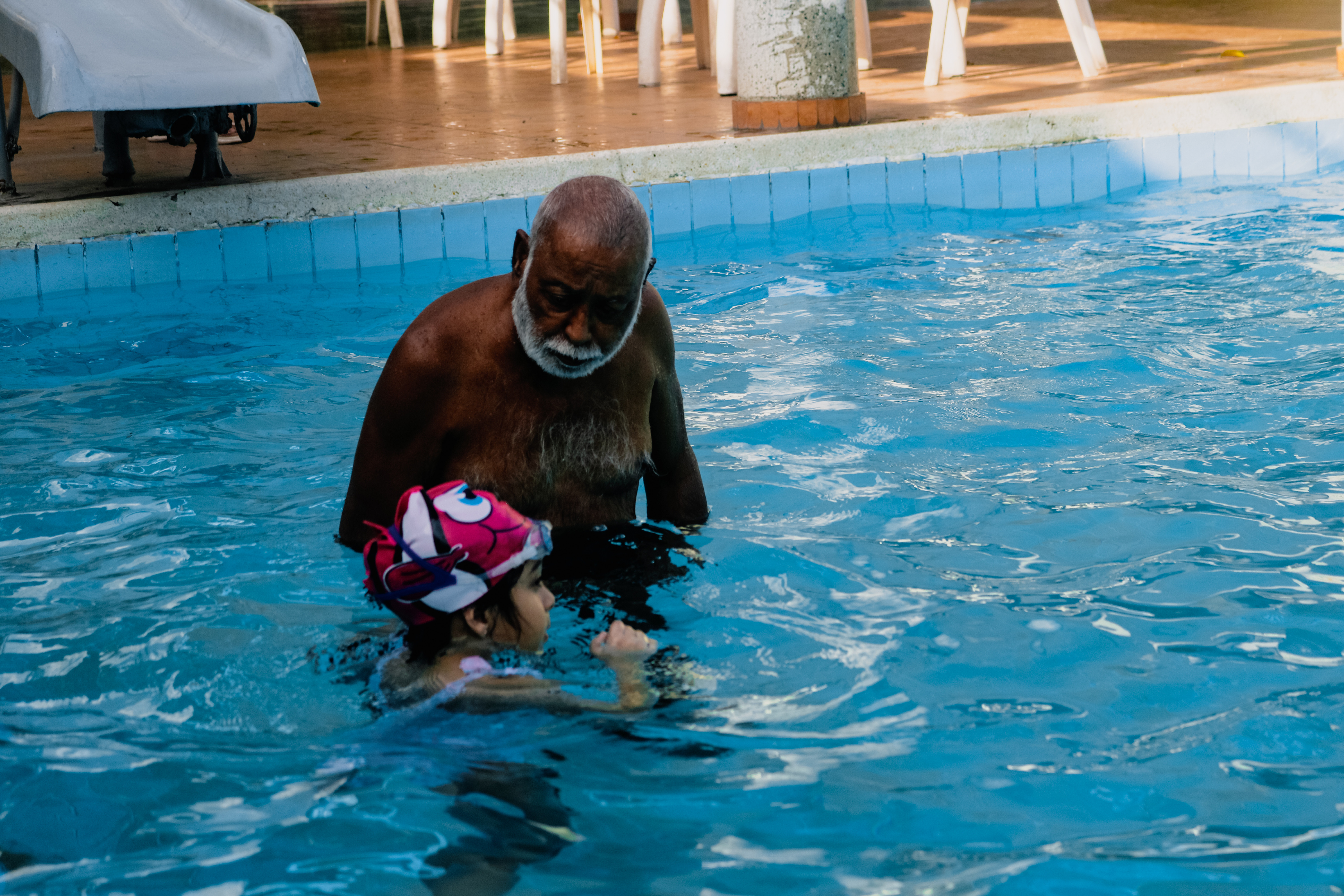
“Sometimes people think I am angry and shout at kids,” says Bato Uncle. “I’m not angry ever. If I would get angry while coaching how to swim, would I continue to doing it for 30 years? I have to communicate with the swimmers who are often children, in an open environment where crows are cawing, people splashing around in the pool. Sometimes we are at a distance, they are in water and I am farther away from them or not even in the pool. My instructions must reach them loud and clear, any ambiguity or confusion can be dangerous in water. Apni jaan apni hatheli par rakh ke insan swimming sikhata hai! [Your life is in your hands, when you are a swim coach] Also my loud instructions are crystal clear to the swimmer who could be a small child and his parents sitting around the pool. So there is no confusion in what I have told the child, and therefore the response is also clear to the parents. The result of my effort comes then and there. They can see if their child is learning or struggling or not following what I am saying to them. And ofcourse, being stern and firm is important, otherwise they will not listen to me and fool around, aur roz aik bacha doobta!
Although, he coaches all ages, Bato Uncle’s youngest students can be three or four years old. “I talk to small kids, sometimes hold them a bit and then support them a little bit in water. They put their instinctive trust in me and start floating. When they start swimming they love it so much that they think mein tau king ban gaya!”
But some kids are slower to learn and need more time.
“Nobody has come to me and not learnt how to swim,” he says. “These tiny things can dive and do swim laps in different strokes. And they learn fast, a lot of children become swimmers by the end of summer camp.
A parent or two might complain about his loud voice and style of coaching because their kids may get nervous as his loud instructions draw the attention of everyone around the pool. But more will agree that in reality, watching his class in progress is live entertainment, Bato the entertainer and the kids his support cast.
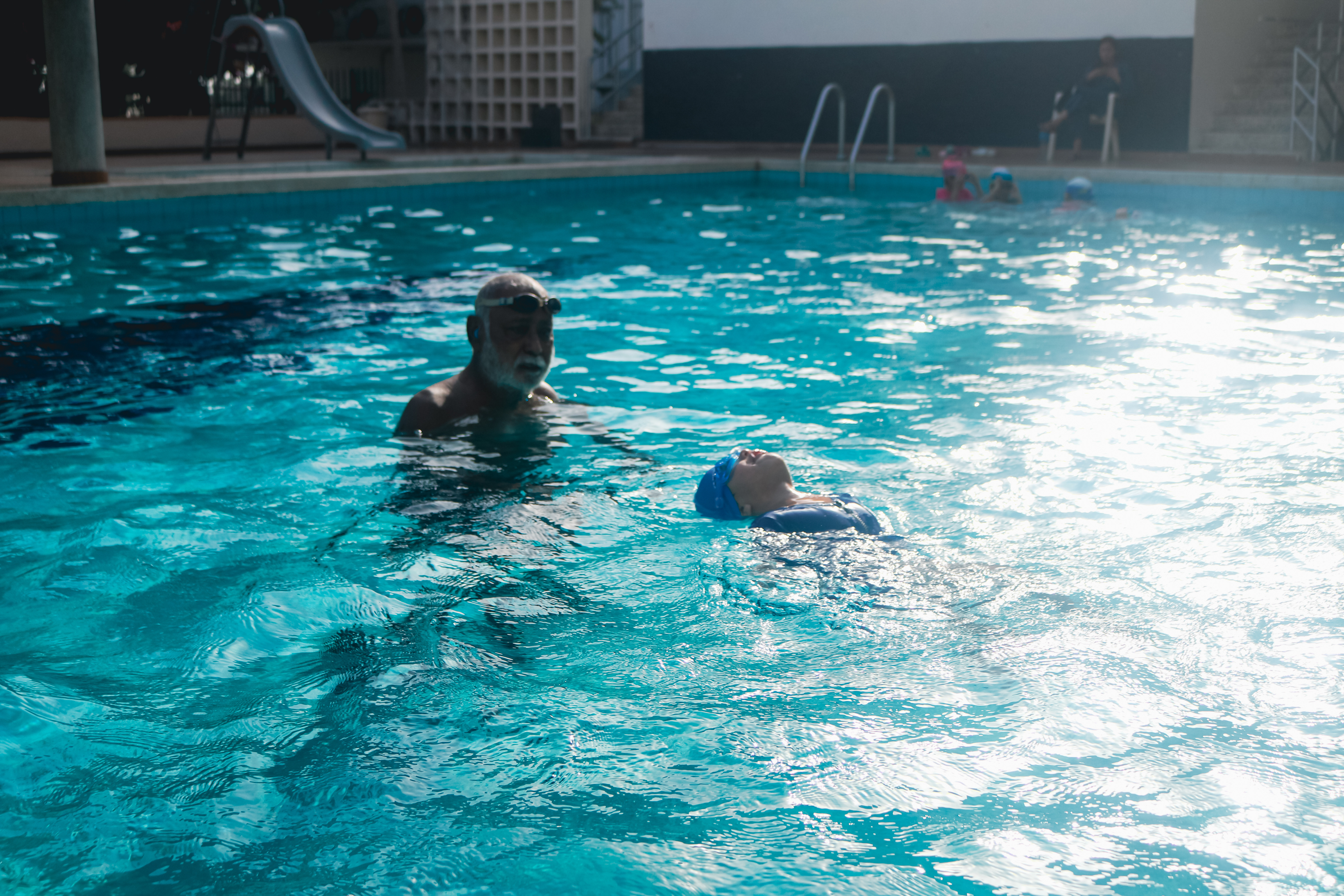
“Sometimes, when kids start crying, their parents get worried and might crib about it, but I don’t ever mind or take offense,” he says. “Because they can see that if a three year old or a four year old is in four-feet-deep water, I have to be loud, clear, stern, firm and serious at the same time. I joke and banter a lot with kids and they get used to my style quickly. They know Bato Uncle means business! And when their children win trophies, they also understand that Bato Uncle means business.”
The swim class ended in a couple of hours and one by one, the children left, but not without last minute warnings, instructions and banter by Bato Uncle.
“People just know me as Bato Uncle, the swim coach,” he says, finally sitting down on a poolside chair, pulling out his blue ear plugs and putting them carefully in a case. “They don’t know or perhaps are not interested in knowing if I am Hindu, Christian or Muslim. Bato Uncle appeals to them universally. I am a Syed for the record. My dad used to call me Bato. It is easy for both kids and grownups to remember. A long time ago, I used to joke with the kids around here and say to them ‘I am next to Mr Bhutto!’”
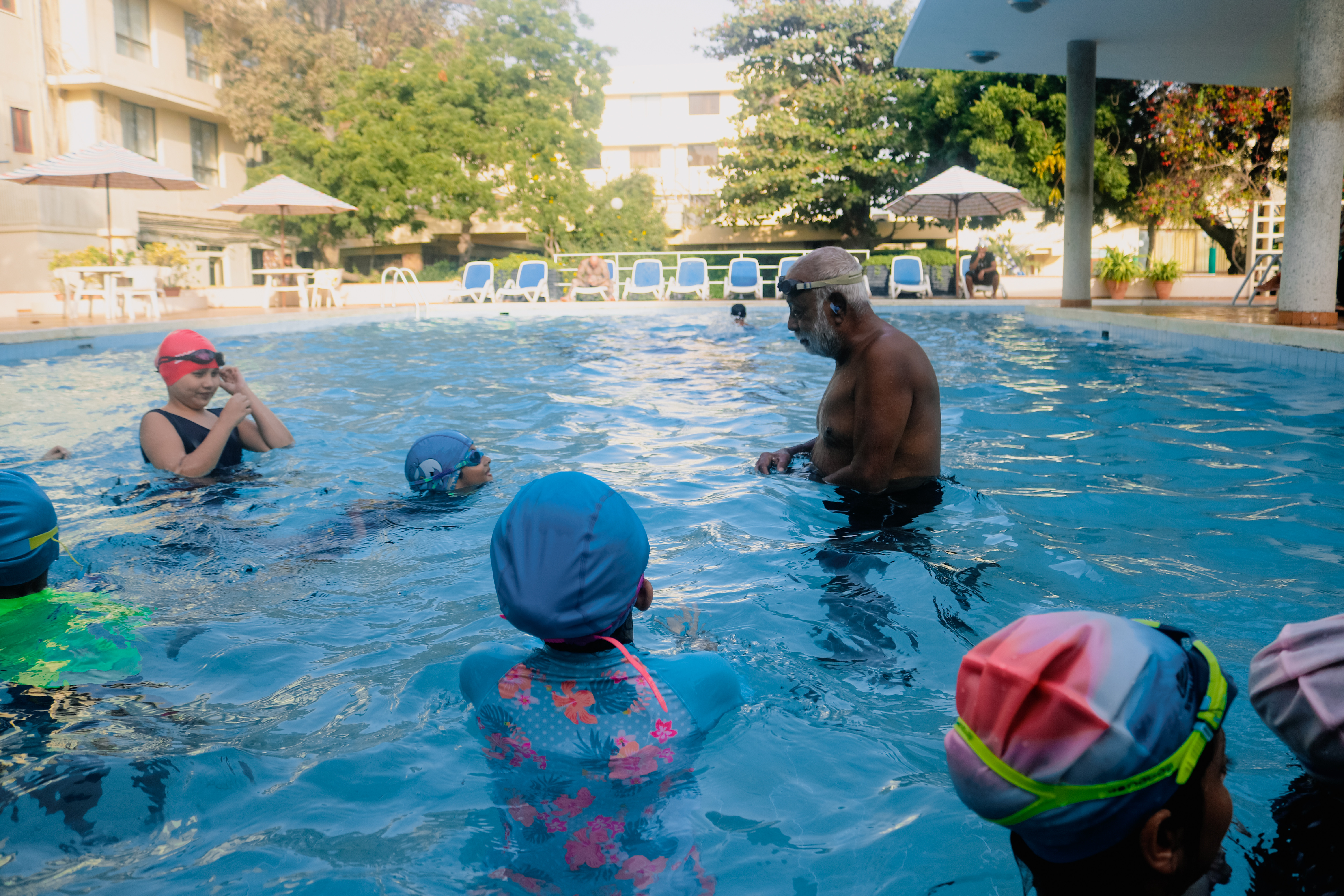
Bato was eight, when he started swimming. “I learnt swimming from Allah Ditta sahib who used to be a swim coach at Habib Public School,” he shares. “When I was about 11, I started coaching how to swim,” he says. “The more I learnt, the more I got into coaching. I have spent my life at this pool and 30 years coaching grownups, kids and differently-abled children how to swim. Kaun hai jiss ko meine nahin sikhaya [There is hardly anyone who has not learnt from me]! Many girls and boys who I taught became extraordinary swimmers and champions in their schools. Some became coachs and now coach how to swim.”
A swimmer all his life, but Bato never thought about competing. His other love is rowing and he has been a rower for many years at Karachi Boat Club. “I used to row with Fawzi Khawaja, Khurram Khawaja, Lt Hadi Abshar and Dinshaw,” he says.” Many times I have swam in this creek, “Often we fell off the boat into the creek and would swim back or jump on another boat that was passing by. ”
Prior to becoming a full-time swim coach Bato worked for Buxly Paints. “I used to swim in this pool, and one day the owner Byram Avari told me to start coaching professionally. The Avaris are like family to me. They have been good to me, and I am very grateful to them. In logo mein itni insaniyat hai ke ap soch nahin saktay [These people are so humane, you have no clue]. And for such nice people, you can’t help being loyal. That is why I have never wanted to go away from here and work somewhere else because when something is good for you, why would you want to change it? I worked full-time and didn’t leave for home before 9pm. Kissi cheez se ishq hojaye tau phir aisa he hota hai [this is how it works when you are passionate about something]…these kids [pointing out at some 30-somethings in the pool], ye meray haath se seekhay hain [they are learnt from me].”
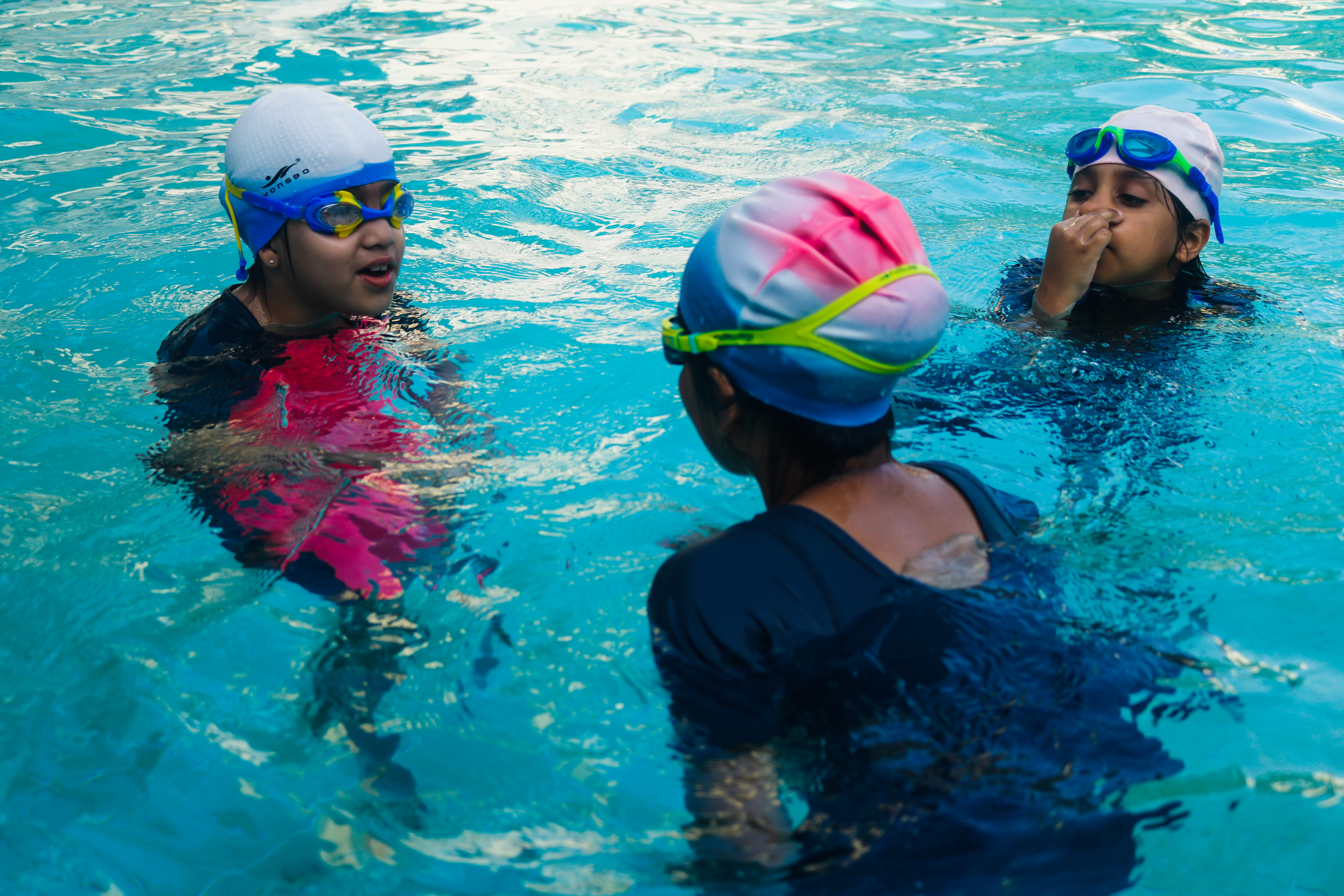
He paused. For a second he looked emotional, an intriguing aspect for a man who in a second could be all over the pool … and poolside. “Issi pool se meine hajj kiya, double hajj kiya [I performed a double hajj through this pool], for me and my dad,” he says. “I taught my kids to swim too. My son Mustafa was a champion for BVS School. My daughter Maheen is a dentist, but is a swim coach for women as well.”
Bato feels that in our country swimming has not been given the recognition it needs, despite the fact that we have some very good swimmers. “They are not valued nor appreciated as sportspeople who are potential winners for the country,” he says.
His eyes go to a middle-aged woman in water at the end of the pool. In her struggle to swim, she spluttered, gasped, spat water out and panted.
“AUNTY AAP KO DEKH KAR MUJHE TAKLEEF HORAHI HAI [It’s painful to watch you],” He yelled across to her. She walked in the water to come closer. “Mujhe bhi takleef horahi hai [I’m having a hard time too], I am 60 and trying to learn to swim,” she smiled but spoke quickly without pausing to take a breath. “It’s on my bucket list, I could never find the time to do this before. I have a fear of water. When I recovered from Covid, I decided that I must learn now. By the way you taught my daughter. She now lives in America, has two kids and is a better swimmer than her husband.”
“Whether you are 60 or 80, you can learn, I will coach you,” he says, a little amused.
He didn’t get in the pool with her. He guided her with a couple of instructions and in less than five minutes, she was following his instructions and floating in water.
The next time she came to the pool, she swam the breadth of the pool, and told me that she thought he was an ogre, but actually is a delightful gentleman and an extraordinary coacher. She said she was still reeling with shock after spending 60 years fearing water, she can now swim.
A little while later, a young mother and daughter arrived for their swim lesson. They were here from England for nine days and had resolved to learn from Bato before their trip ended. Their busy life in England did not allow them the time to take classes.
“You see I’m not going to move her arms for her or breathe for her, she has to do it herself,” he says, in between instructing the mother who seemed to be a quick learner.
What about his own YouTube channel as Olympic and non-professional swimmers from everywhere in the world had their own channels and videos as swim coaches?
“This is a hands-on skill, you cannot coach someone to swim through videos,” he says, brushing the suggestion aside. “You just saw how I guided the lady who was struggling with breathing with her head out of the water, and now she takes her head out of water to breathe while swimming. Video se koi yeh sar bahar nikalwaday [if anyone could get her head out of water through a video], I will shoot myself!”
A man of discipline and rules, it bothers Bato when people don’t have the right etiquette or attitude for swimming.
“This is an educated country, but people don’t have common sense,” he says. “They swim in the river wearing shalwar kameez and then they drown. They come to the pool in all kinds of shorts and half pants ask me if they can swim in them and I have to tell them, swim trunks must be worn, because the water in the pool is enough to drown you in the wrong clothes if you can’t swim. Pata bhi nahin chalay ga kya hua [You won’t know what happened]. People also come to me and lie that they can swim and then they start drowning in the pool. Swimming is something you can’t lie about.”
“But then, lying and cheating has become a part of us,” he says sadly. “I love being in Pakistan, and couldn’t live abroad, even when I had the chance I returned. But what has become of this country? The economy and political situation is out of control. But I don’t want to be misconstrued, I’m not for anyone or against anyone, I just love swimming and coaching people to swim. This is where I belong and flourish as a soul and as a person.”
Bato Uncle cherishes a 2013 letter from Francis Campbell, the British Deputy High Commissioner, Karachi, thanking him for being an ‘outstanding, patient, most skilled and professional teacher and giving him the gift of the confidence to swim, which he could avail for the rest of his life.’
Bato Uncle watches the middle-aged woman doing lap after lap. “AUNTIE! YOU ARE ENJOYING IT NOW, AREN’T YOU?” She swam towards him. “I still can’t believe, I can swim.”
“It’s time to give back to this pool,” he says staring at the water. “This pool is why I exist, swimming na ho tau mein marjaoonga [If I didn’t swim I would die].”
